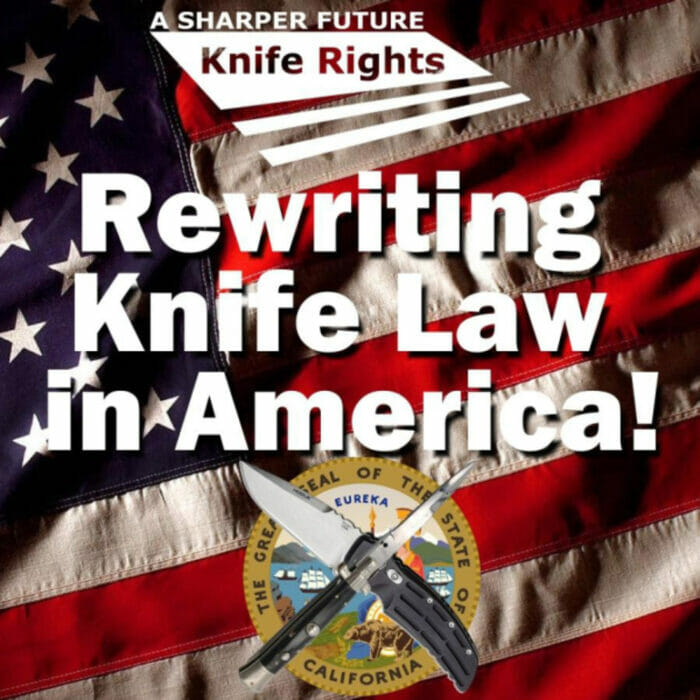Knife Rights Sues California to End “Switchblade” Ban
Knife Rights today filed a federal lawsuit challenging California’s complete ban on common automatic knives 2 inches and greater than the State prohibits as illegal “switchblades.” Joining Knife Rights in the case are Knife Rights members James Miller, Garrison Ham, and Eliot Kaagan and knife retailer members North County Shooting Center and Poway Weapons and Gear. They are represented by attorney John W. Dillon at the Dillon Law Group.
Named as defendants are California Attorney General Rob Bonta and other government officials. The lawsuit, Knife Rights, Inc. v. Bonta, was filed in U.S. District Court for the Southern District of California. Click here to read the complaint.
In its complaint, the plaintiffs allege that the State’s ban is unconstitutional and said that “there can be no question that knives are “arms” protected under the plain text of the Second Amendment.… And indeed, the Supreme Court made clear in [NYSRPA v. Bruen] that the Second and Fourteenth Amendments protect the right to acquire, possess, and carry arms for self-defense and all other lawful purposes inside and outside the home.” In fact, automatic knives that are banned in California are widely legally possessed in at least 43 of 50 states.
Knife Rights Chairman Doug Ritter said, “Under Supreme Court precedent, California’s ban on these common and constitutionally protected knives cannot pass muster and must be enjoined. Since 2010, Knife Rights has led the charge to restore the right to keep and bear these knives and successfully repealed civilian switchblade bans in 16 states. As the premier advocacy organization for the right to possess and carry knives, Knife Rights looks forward to striking down all unconstitutional knife bans throughout the United States.”
In its 2022 NYSRPA v. Bruen decision, the Supreme Court emphasized that the Second Amendment right to keep and bear arms, applied against states and local governments through the Fourteenth Amendment, is not “a second-class right, subject to an entirely different body of rules than the other Bill of Rights guarantees.” In 2021, Knife Rights filed an important amicus (friend of the court) brief in the Supreme Court that was cited in the Bruen decision.
Attorney John Dillon said, “It’s time for California to accept reality and understand that it can no longer strip Californians of their right to keep and bear arms for self-defense by banning useful arms like automatic knives. The State’s ban has never prevented a crime; it has never saved a life; it has never helped anyone. All that it has done is prohibited peaceable people from their right to choose what they own and carry for self-defense and too often leads to unnecessary interactions with law enforcement, sometimes with tragic results.”
Background
Broadly, in NYSRPA v. Bruen the Supreme Court held that the Second Amendment includes the right to be armed for self-defense at home and in public. This right can only be limited to the extent that there is a historical tradition of limitation in the period immediately prior to and around the time of the Constitution’s framing in the late 18th century up to the late 19th century. A few restrictions on knives of various sorts that are outliers from that time period do not count. Restrictions imposed later, including on switchblades in the 1950s, don’t count. Possession and carrying of knives survives this constitutional test.
NYSRPA v. Bruen upheld restrictions on weapons such as machine guns that are deemed by the court to be both “dangerous and unusual.” A weapon that is either not “dangerous” or not “unusual” cannot be prohibited. Automatically opening (“switchblade”) knives and other knife designs and opening mechanisms are neither “unusual,” being legal and common in most places today, nor any more “dangerous” than other non-prohibited knives or weapons. Knife bans existent today do not pass constitutional muster after Bruen.
NYSRPA v. Bruen also emphasized emphatically from the court’s prior Second Amendment McDonald decision that “the constitutional right to bear arms in public for self-defense is not a second-class right, subject to an entirely different body of rules than the other Bill of Rights guarantees.” Second Amendment decisions by courts must be made on the basis of strict scrutiny, just as with other rights. Intermediate scrutiny or “interest balancing” can no longer be used to decide Second Amendment cases. As such, the government can no longer defend knife bans because the government doesn’t like a particular type of knife, for whatever irrational basis it comes up with.

